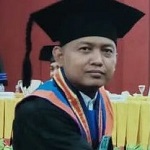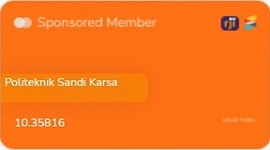The Effect of Husband Support and Economic Status Level on Exclusive Breastfeeding
Abstract
The main problem of low exclusive breastfeeding in Indonesia is the influence of socio-cultural factors and lack of knowledge of pregnant women, families, and communities. This study aims to determine the effect of husband support and economic status level on exclusive breastfeeding. This research is quantitative with a cross-sectional approach where this design emphasizes the time of data measurement and observation of both variables. The sample of this study amounted to 57 respondents. The results of the study found that H1 received showed the influence of husband support on exclusive breastfeeding, H2 received showed the power of the level of economic status on exclusive breastfeeding, H3 received husband support and the level of financial quality simultaneously or jointly affected the dependent variable, namely exclusive breastfeeding. It can be concluded that husband support has a natural effect on partial exclusive breastfeeding, the influence of the level of economic status on exclusive breastfeeding, and husband support and the level of financial quality affect exclusive breastfeeding
Downloads
References
F. Rezal, “Hubungan Pengetahuan, Sikap dan Status Ekonomi dengan Pemberian ASI Esklusif Pada Bayi Usia 0-6 Bulan di Wilayah Kerja Puskesmas Lampeapi Kabupaten Konawe Kepulauan,” Nurs. Care Heal. Technol. J., vol. 1, no. 2, pp. 94–101, 2021.
B. W, “Hubungan Dukungan Suami Terhadap Pemberian Asi Eksklusif Di Wilayah Kerja Puskesmas Rawat Inap Tanjung Bintang Lampung Selatan Tahun 2020.” Poltekkes Tanjungkarang, 2020.
I. N. Bagiastra and N. M. A. Yuliartini Griadhi, “Model Pengaturan Anti Obesitas Dalam Rangka Penguatan Serta Peningkatan Derajat Kesehatan Masyarakat Di Indonesia,” J. Ilmu Sos. dan Hum., vol. 8, no. 2, p. 242, Oct. 2019, doi: 10.23887/jish-undiksha.v8i2.22377.
I. Y. Habibie, A. N. Imanti, G. P. Dyanti, and R. I. Aprilia, “Narrative Literature Review: Media Edukasi Kalender Berpengaruh Terhadap Peningkatan Pengetahuan Dan Perubahan Perilaku Mengenai Stunting Di Indonesia,” J. Nutr. Coll., vol. 12, no. 3, pp. 207–214, Aug. 2023, doi: 10.14710/jnc.v12i3.37648.
T. Ismail, Y. Yunarti, and S. Meiyenti, “Pengetahuan Ibu Menyusui dalam Pemberian ASI Ekslusif Bayi di Lingkungan Prioritas Stunting,” Aceh Anthropol. J., vol. 7, no. 1, p. 41, Apr. 2023, doi: 10.29103/aaj.v7i1.9493.
K. Kabariyah and A. Anggorowati, “Breastfeeding Self-Efficacy di Wilayah Kerja Puskesmas Batang 1,” Holist. Nurs. Heal. Sci., vol. 6, no. 1, pp. 12–18, Jul. 2023, doi: 10.14710/hnhs.6.1.2023.12-18.
A. Mauliddina, S. Pabidang, and Y. Kusmiyati, “Pengaruh Kelas Ayah Terhadap Perilaku Pemenuhan Kebutuhan Gizi Pada Bayi Resiko Stunting Di Kabupaten Sleman,” J. Ners, vol. 7, no. 1, pp. 489–500, Apr. 2023, doi: 10.31004/jn.v7i1.13761.
T. Limbong, “Faktor Pendukung dan Penghambat Peran Pendampingan Suami Terhadap Isteri Pada Masa Kehamilan dan Persalinan,” J. Ilm. Kesehat. Sandi Husada, vol. 10, no. 2, pp. 475–483, Dec. 2021, doi: 10.35816/jiskh.v10i2.635.
S. A. S. SJMJ, R. C. Toban, and M. A. Madi, “Hubungan Pemberian ASI Eksklusif Dengan Kejadian Stunting Pada Balita,” J. Ilm. Kesehat. Sandi Husada, vol. 11, no. 1, pp. 448–455, Jun. 2020, doi: 10.35816/jiskh.v11i1.314.
M. Musfirah, M. Rifai, and A. K. Kilian, “Faktor yang Memengaruhi Kepatuhan Imunisasi Tetanus Toksoid Ibu Hamil,” J. Ilm. Kesehat. Sandi Husada, vol. 10, no. 2, pp. 347–355, Dec. 2021, doi: 10.35816/jiskh.v10i2.619.
M. Frisilia and E. Handriani, “Hubungan Pengetahuan Manajemen Laktasi dengan Pemberian ASI Eksklusif pada Ibu Menyusui,” J. Surya Med., vol. 8, no. 3, pp. 42–59, Dec. 2022, doi: 10.33084/jsm.v8i3.4497.
H. Maulida, E. Afifah, and D. Pitta Sari, “Tingkat Ekonomi dan Motivasi Ibu dalam Pemberian ASI Eksklusif pada Bayi Usia 0-6 Bulan di Bidan Praktek Swasta (BPS) Ummi Latifah Argomulyo, Sedayu Yogyakarta,” J. Ners dan Kebidanan Indones., vol. 3, no. 2, p. 116, Mar. 2016, doi: 10.21927/jnki.2015.3(2).116-122.
N. Khofiyah, “Analisis Faktor-Faktor yang Mempengaruhi Pemberian ASI Eksklusif di Puskesmas Umbulharjo I Yogyakarta,” J. Kebidanan, vol. 8, no. 2, p. 74, Aug. 2019, doi: 10.26714/jk.8.2.2019.74-85.
S. R. Wulandari and W. Winarsih, “Hubungan Dukungan Suami Dengan Pemberian ASI Eksklusif,” J. Kesehat. SAMODRA ILMU, vol. 14, no. 01, pp. 8–12, May 2023, doi: 10.55426/jksi.v14i01.245.
L. A. Br. Pasaribu, S. Yati, and W. Do Toka, “Hubungan Pengetahuan Ibu tentang Makanan Pendamping-Air Susu Ibu dengan Status Gizi pada Anak Usia 6-24 Bulan,” Sari Pediatr., vol. 25, no. 2, p. 112, Aug. 2023, doi: 10.14238/sp25.2.2023.112-6.
R. Aditya, S. L. Tobing, F. Armanza, H. Halimah, B. T. Unsandy, and N. A. Ariyani, “Upaya Pencegahan Stunting Ibu Hamil Melalui Kelas Ibu Hamil dan Demo Masak di PKM Alalak Selatan,” J. Pengabdi. ILUNG (Inovasi Lahan Basah Unggul), vol. 3, no. 1, p. 120, Aug. 2023, doi: 10.20527/ilung.v3i1.9492.
S. Suprapto, T. C. Mulat, and H. Hartaty, “Edukasi Gizi Seimbang Menggunakan Media Video terhadap Pengetahuan dan Sikap Mahasiswa di Masa Pandemi Covid-19,” J. Keperawatan Prof., vol. 3, no. 1, pp. 96–102, May 2022, doi: 10.36590/kepo.v3i1.303.
S. L. Louis, A. N. Mirania, and E. Yuniarti, “Hubungan Pemberian ASI Eksklusif dengan Kejadian Stunting pada Anak Balita,” Matern. Neonatal Heal. J., vol. 3, no. 1, pp. 7–11, Jan. 2022, doi: 10.37010/mnhj.v3i1.498.
J. Heymann, A. Raub, and A. Earle, “Breastfeeding policy: a globally comparative analysis,” Bull. World Health Organ., vol. 91, no. 6, pp. 398–406, Jun. 2013, doi: 10.2471/BLT.12.109363.
T. Nurhidayati, H. Rosiana, and R. Rozikhan, “Usia Ibu Saat Hamil Dan Kejadian Stunting Pada Anak Usia 1-3 Tahun,” Midwifery Care J., vol. 1, no. 5, pp. 122–126, Nov. 2020, doi: 10.31983/micajo.v1i5.6491.
K. M. Krol and T. Grossmann, “Psychological effects of breastfeeding on children and mothers,” Bundesgesundheitsblatt - Gesundheitsforsch. - Gesundheitsschutz, vol. 61, no. 8, pp. 977–985, Aug. 2018, doi: 10.1007/s00103-018-2769-0.
Copyright (c) 2023 Maria Oktaviana Mamoh, Gunarmi Gunarmi, Juda Julia Kristiarini

This work is licensed under a Creative Commons Attribution 4.0 International License.













3.png)






